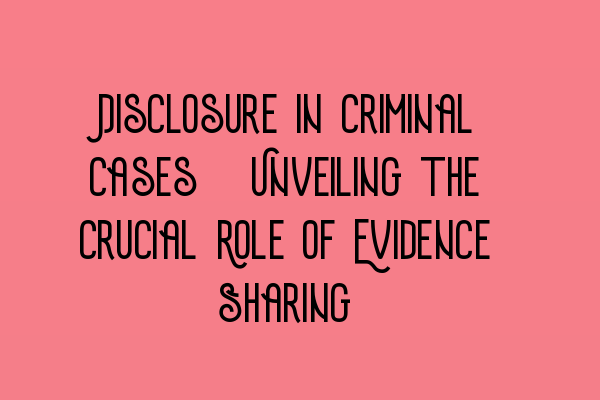Disclosure in Criminal Cases: Unveiling the Crucial Role of Evidence Sharing
Disclosure plays a crucial role in criminal cases, as it involves the sharing of evidence between the prosecution and the defense. The principle of disclosure ensures fairness and transparency in the criminal justice system. In this blog post, we will explore the importance of disclosure and its impact on the outcome of criminal cases.
The Importance of Disclosure
Disclosure is essential for both the prosecution and the defense to prepare their cases effectively. It ensures that all relevant and reliable evidence is made available to both sides, enabling them to present a strong argument in court. Without disclosure, there would be an inequality of arms, and innocent individuals could be wrongly convicted.
Disclosure promotes a fair trial by allowing the defense to challenge the evidence presented by the prosecution. It enables defendants to exercise their right to a full and proper defense, as enshrined in Article 6 of the European Convention on Human Rights. It also helps prevent wrongful convictions and protects the integrity of the justice system.
The Process of Disclosure
The process of disclosure begins when a defendant is charged with a criminal offense. The prosecution is responsible for gathering and reviewing evidence that supports the case against the defendant. This evidence may include witness statements, CCTV footage, forensic reports, and any other relevant material.
Once the prosecution has identified material that is relevant to the defense or material that may undermine the prosecution’s case, it must be disclosed to the defense. This ensures that the defense has all the necessary information to prepare their case and challenge the prosecution’s evidence effectively.
The defense also has a duty of disclosure. They must disclose any evidence or information that may assist the prosecution in proving the case against the defendant. This promotes transparency and ensures that both sides have access to all relevant information.
The Impact of Disclosure on Criminal Cases
The quality and adequacy of disclosure can significantly impact the outcome of criminal cases. Insufficient disclosure or non-disclosure of relevant evidence can lead to miscarriages of justice and wrongful convictions. It is therefore crucial for both the prosecution and the defense to fulfill their disclosure obligations.
For example, a recent case involving SQE Exam Prep highlighted the importance of proper disclosure. The defense team discovered new evidence that contradicted the prosecution’s case. This evidence, which was initially withheld by the prosecution, led to the acquittal of the defendant.
The outcome of a criminal case can also be influenced by the timing of disclosure. Prompt and early disclosure allows the defense sufficient time to analyze and investigate the evidence, ensuring a fair trial. Delays in disclosure can lead to adjournments and may compromise the defendant’s right to a speedy trial.
Conclusion
Disclosure is a fundamental aspect of the criminal justice system that ensures fairness, transparency, and the right to a fair trial. It plays a crucial role in enabling both the prosecution and the defense to present their cases effectively. Proper disclosure helps prevent wrongful convictions and upholds the principles of justice.
